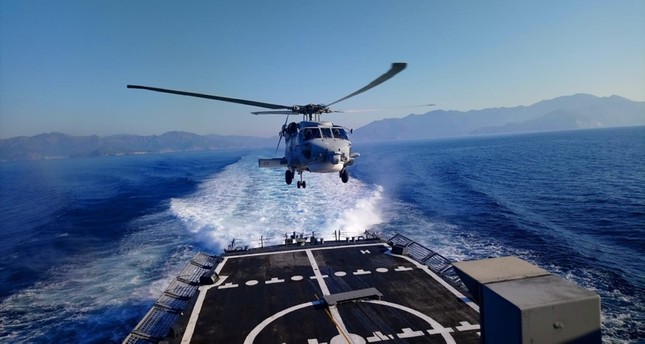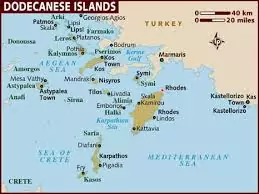
Turkey Fumes as Greece Offers Use of Eastern Aegean Islands to NATO, US
Turkey Fumes as Greece Offers Use of Eastern Aegean Islands to NATO, US
Relations between Turkey and Greece are the most fractious of any pair of the North Atlantic Treaty Organization’s (NATO) 29 member countries. Disputes range from contested offshore hydrocarbon exploration to Athens granting political refugee status to two of eight Turkish officers who fled to Greece after the failed July 2016 coup attempt (Hürriyet Daily News, May 24, 2018). Now, Turkey is protesting Greece’s activities off its Aegean coast. On May 12, Turkish Foreign Ministry spokesperson Hami Aksoy stated that Turkey claims Greece does not respect the demilitarized status of its islands in the eastern Aegean, adding that NATO warships operating in the Aegean should not use Greek ports there for visits and refueling (Mfa.gov.tr, May 12, 2019). Aksoy’s concerns mask a broader anxiety in Ankara that NATO and the United States may be planning to deepen their military presence in the eastern Mediterranean to include more bases in Greece and its Aegean islands.
The Dodecanese Islands have a long and convoluted history. Over more than two millennia, the archipelago has been ruled, in succession, by Crete, Mycenaean Greece, Dorians, the Persian, Macedonian, Roman and Byzantine empires, and the Knights Hospitaller, before passing under Ottoman rule and, during the 20th century, briefly Italy, until finally coming under Greek rule in 1947.

Aksoy stated that Turkish objections stem from the islands’ “irregular” legal status, governed by “a number of international treaties, including the 1923 Treaty of Lausanne and the Treaty of Paris in 1947. These international treaties, which are still in force and therefore legally binding on Greece, prohibit the arming of the eastern Aegean islands and impose legal responsibilities on Greece” (Mfa.gov.tr, May 12).
The subject of a US or NATO base in the Dodecanese Islands arose in May 2015, when the new Greek Syriza coalition government’s defense minister, Panos Kammenos, visited Karpathos, the second-largest island in this archipelago. That event, which was followed closely in the Turkish media, pushed the Greek parliamentary opposition to request clarification of the minister’s activities and the government’s position on the basing issue (Sabah, May 25, 2015).
Turkish concerns about Greece’s intentions in the Dodecanese archipelago reemerged on October 9, 2018, when then–US Defense Secretary James N. Mattis welcomed Greek Defense Minister Panagiotis Kammenos to the Pentagon. According to Defense Department spokesperson Dana W. White, Mattis reaffirmed the long-standing defense relationship between Washington and Athens, and the pair “discussed continuing efforts to combat Russian malign influence in the region” (Defense.gov, October 10, 2018).
In reporting on Kammenos’ meeting with Mattis last fall, the Greek press added that the defense minister proposed the US expand its military presence beyond Souda, in Crete, to the cities of Larissa and Volos, in Thessaly, and Alexandroupolis, in Thrace. A strong US military presence in Greece, Kammenos reportedly argued, is important in a region where new threats are rising (The Greek Reporter, October 10, 2018). The meeting fueled earlier speculation (published in the Greek media and expressed by some Greek politicians) that, beyond the aforementioned cities, the Pentagon was also interested in a facility on Karpathos (New Europe, October 10, 2018).
Kammenos’ visit to Washington heightened Turkish concerns as, a month earlier, Marine Corps General Joe Dunford, the chairman of the US Joint Chiefs of Staff, had traveled to Athens to see the eastern Mediterranean region “through a Greek lens.” Dunford told reporters that the Greeks were open to increasing military cooperation with the United States: “[They] made a general overture, saying they would be willing to consider that, and I certainly was enthusiastic about the possibility.” Dunford and his Greek hosts reviewed a number of crucial Mediterranean issues, including Libya, Syria, the refugee issue and Greece’s “interesting perspectives on the Russian naval presence in the eastern Mediterranean… I think we both agreed that we are seeing something we haven’t seen since the 1980s in terms of the operational patterns of the Russians in the area.” For fellow NATO ally Turkey, the most concerning element of Dunford’s visit came when (according to Dunford) Hellenic National Defense General Staff head Admiral Evangelos Apostolakis “expressed interest in expanding [US] access to [Greek] bases” (Defense.gov, September 4, 2018).
Ankara’s response to Athens’ cozying up to Washington—particularly as Turkey’s own relations with the US have continued to deteriorate—has been to demonstrate its own military prowess. The day after Aksoy made his observations regarding the eastern Aegean islands, Turkey began its massive Denizkurdu 2019 (“Sea Wolf 2019”) military exercises. The maneuvers, pointedly supervised by the Turkish navy, ran through May 25. According to a statement by the Turkish General Staff, the exercises in Turkey’s eastern Mediterranean, Aegean and Black Sea coastal waters involved 131 warships, 57 warplanes and 33 helicopters (Haberturk, May 13). The Denizkurdu 2019 drills included shore bombardment, anti-submarine warfare (ASW) and medical battlefield defense exercises, involving 25,900 naval personnel (Anadolu Agency, May 14).
The United States and Turkey have many, deepening policy disputes: Syria, Iran, US support for Syrian Kurdish forces, Mohammed bin Salman’s activities, Russia, S-400 purchases, involvement in the F-35 program, support for the Palestinians, and criticism of Israel, among others. That said, President Recep Tayyip Erdoğan’s government presumably has no wish to see its positions in NATO and Washington diminished and supplanted by Greece. And given regional security volatility and the unpredictability of the current US administration, the only short-term certainty is uncertainty.


